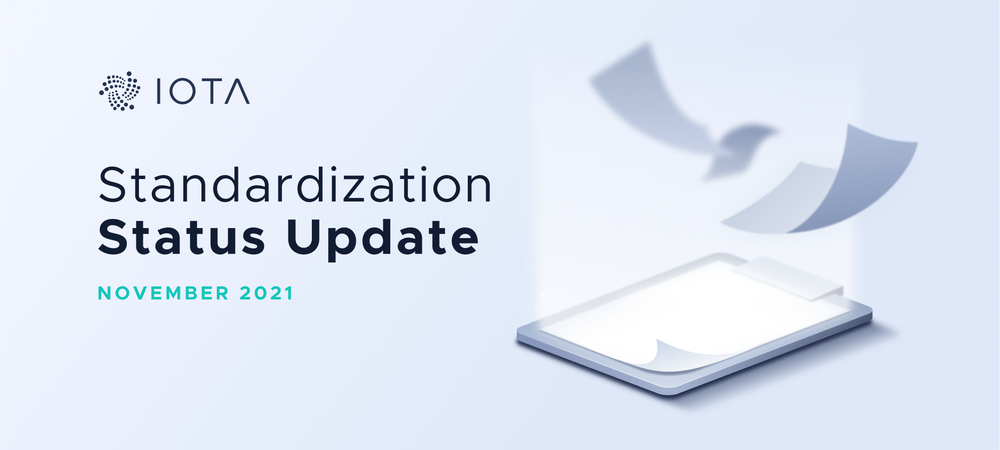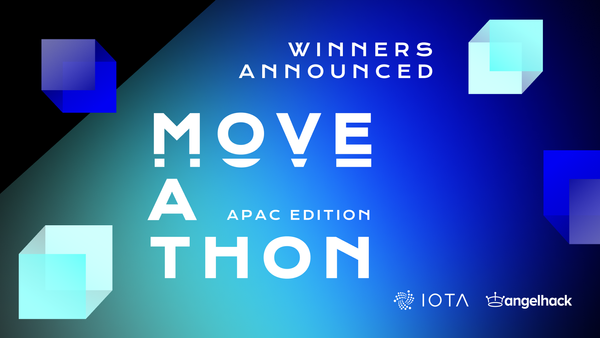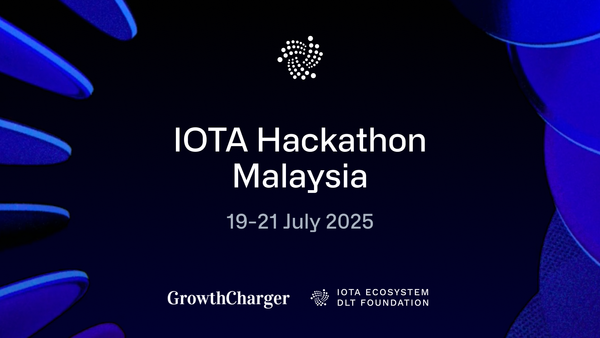IOTA Standardization Update November 2021
TL;DR:
This standards update covers IOTA standards activities at the OMG and elsewhere, as well as Object Management Group distributed ledger technology (DLT) activities more generally. These cover Streams (the LETS RFP), smart contracts, self-sovereign identity, supply chains, digital currency and crypto asset identifiers.
After two years of meeting virtually at the Object Management Group (OMG), we will once again be meeting face to face in Long Beach, California in early December.
At the most recent OMG quarterly meeting, conducted online at the end of September, we advanced several distributed ledger-related initiatives, including those of direct relevance to the IOTA Foundation and things relating to the wider world of DLT. At this meeting we covered:
- LETS RFP – an extension of the submission date for responses to this RFP
- Smart contracts RFI
- Disposable Self-sovereign identity RFI and next steps
- Digital currency and the ontology of money
- Roll-out of the OMG FIGI identifier to crypto-assets
This blog brings you up to date on each of these initiatives, both on what happened at the OMG Quarterly Meeting and up to the present time.
Our strategy at the IOTA Foundation is to set the standard for graph-based distributed ledger technology. This includes submitting the core IOTA protocol that defines the Tangle, as well as leading the way in the standardization of other DLT ecosystem features like smart contracts and messaging (Layer 1 or Layer 2 standards).
The IOTA Protocol
The core IOTA protocol will be based on the fully decentralized IOTA 2.0. The formal written specifications for this are in good shape and will form the basis of a submission to the OMG for the IOTA protocol standard. The decentralized IOTA protocol is running on the IOTA 2.0 DevNet and recent strides on consensus mean that it may not be long before this can be submitted to the OMG through the Request For Comment (RFC) process.
Linked Encrypted Transaction Streams (LETS)
The Linked Encrypted Transaction Streams (LETS) Request for Proposal (RFP) solicits responses in the form of a proposed standard for creating streams of linked messages with various levels of encryption and digital signatures.
The IOTA Streams Framework will form the basis for the IOTA Foundation's submission in response to this RFP. This means that the corresponding IOTA product (the Channels application) would be able to assert conformance to this standard. Other products, including the SKALY Freighter product, would also be conformant to this proposed standard and will not need to submit separate responses to the RFP itself.
In terms of the OMG process, any member organization may submit a response to this RFP, but to date none has, and we expect that the IOTA Streams submission will form the basis for this standard.
At the September quarterly meeting the OMG extended the deadline for responses to this RFP, to this month (November 2021) for formal review and voting at the December Quarterly Meeting in Long Beach.
Review of the submission at Long Beach will be based on the current draft Streams specification, and we expect to receive a lot of feedback from people at the OMG, including for example how to inter-operate with applications that use existing OMG standards like the Data Distribution Service (DDS) family of standards.
The IOTA Streams team has produced the most recent internal formal specification for the Streams protocol (including the Data Description and Modification Language DDML), so we are on track for filing our formal response to this RFP. Assuming all goes to plan at the Long Beach meeting, this will start the formal standards adoption process, resulting in an international OMG standard defining what Streams does, so that anyone can write applications that conform to the LETS standard.
Smart Contracts
The OMG Blockchain Platform Special Interest Group has been working for some time on a Request for Information (RFI) for smart contracts. The Smart Contract RFI is intended to gather feedback and knowledge from the industry about smart contracts, so as to help us identify what if any standards could be developed at the OMG in this area. We would not want to overlap with or duplicate standards already developed and maintained elsewhere, such as the growing list of Ethereum Request for Comments (ERC) standards.
The Smart Contracts RFI covers a wide range of questions, from business and legal questions (such as "Is a smart contract a contract?") through to more technology-oriented questions, where a smart contract is considered as a distributed application (dApp).
Potential standards that may arise out of this exercise would be similarly wide-ranging, from business concerns to technical aspects such as common interfaces or payloads.
On the business side, potential RFPs may include business and concept definitions standardization, such that you can generate modular smart contracts from a common set of business terms, ideally defined in an ontology (a formal model of business semantics, as distinct from a vocabulary or a data model). This would fit very well with the IOTA smart contracts architecture in particular.
The responses to this RFI will help the OMG identify what if any features of smart contracts can be served by new OMG standards.
One potential in terms of standardization is where arrangements that would make little sense for the Ethereum community may be viable on a feeless DLT such as the IOTA Tangle. For example, there may be good reasons to include additional metadata in some smart contract payloads that would not make economic sense in an Ethereum ERC standard. This is the kind of scenario in which it would make sense to propose a new OMG standard via the RFP process.
The Smart Contracts RFI will be presented and finalized at the December OMG Quarterly Meeting. All being well, this will then be published in early January with a couple of months for people to respond. Once the responses are in, either in the March or June Quarterly Meeting, we can identify possible future standards and start to draft the RFPs for these.
Anyone can respond to an OMG RFI, whether or not they are an OMG member, and responses are welcomed from individuals within the IOTA Foundation and the wider IOTA community, as well as business entities. Also if you are interested in responding to this and would need more time to respond, please let us know so we can set the response dates accordingly when we vote on this in December.
Now that the IOTA Foundation has developed smart contract solutions that are innovative and highly interoperable across DLT ecosystems, we would like to make sure that any potential IOTA contribution to standardization in the smart contracts space is identified so we can take these forward and become the go-to standards for smart contracts.
Disposable Self-sovereign Identity
Disposable Self-sovereign Identity (SSI) deals with the scenario of using existing SSI (DID) and Verifiable Credential (VC) standards from the W3C, in a specific way. This is where a DID-compliant SSI is minted to cover a specific user context and is disposed of afterward. This opens up some fascinating improvements in how individual end-users get to remain in control of all aspects of their own identity and credentialing.
While this proposal is called 'disposable' SSI, implying the notion of a sort of 'burner' identity, the reality is that we would be standardizing a way to formalize the context in which these disposable identities are used, for example, a specific journey or a particular set of services (automotive, healthcare, government, etc.). The OMG published the Disposable Self-sovereign Identity RFI at the end of 2020.
The responses for this RFI have now all been received, and we spent the September meeting working through these. We think there is potential for standardization in this area, possibly in as many as three distinct standards. For example, the notion of 'context' may be standardized at a business level, with the semantics of these contexts reflected in an ontology model. In addition, more technology-oriented standardization may be of value, for example in how DID payloads are configured to support the contextual SSI arrangements in a standardized way.
These potential standards ideas will be discussed in detail at the December Quarterly Meeting. In reviewing this we would also make sure not to reinvent standards already under development by other standards bodies, such as the W3C or the Digital Identify Foundation (DIF), who are developing a number of potential standards in the DID space. If we identify the potential for unique new standards to support this contextual usage of DID/SSIs, we will start to work on one or more RFPs in the following quarter, for potential review and issuance in March 2022.
Conformance with these new standards, when they emerge, can be added to the capabilities of the IOTA Identity product.
Meanwhile, the IOTA Identity team has been working on a standard based on the DIDComm standard from DIF.
OMG Reference Architectures for DLT
The OMG also maintains a Reference Architecture (RA) covering not only DLTs but other comparable distributed architectures. This is called the Distributed Immutable Data Objects (DIDO) RA. This covers a broad range of ecosystem considerations, including quality controls, testability, and the use of applicable standards. A new version of this DIDO RA was presented and issued at the September quarterly meeting.
One feature of the DIDO RA that is potentially of interest is the ability to spin up test environments with multiple nodes with a given DLT architecture. This has already been done for the IOTA protocol as a proof of concept.
Future OMG DLT Standards Potential
The OMG Blockchain Platform SIG continues to explore other potential areas for standardization in the DLT space. These may include for example standardized interfaces or behaviors relating to different features of a DLT ecosystem, such as oracles and exchanges, as well as things like DAOs and NFTs. We also continue to work on a common vocabulary and common definitions of underlying concepts for DLTs, as an aid to interoperability, testability, and use of existing software industry standards (covered in the DIDO reference architecture).
Supply Chain Interoperability
One motivation for member firms at the OMG is interoperability, for example in supply chains. Member firms in aerospace and retail among others are increasingly concerned that as parts of their supply chains start to use different blockchains and DLTs, it will be difficult to ensure smooth integration across those often very complex supply chains. This is a real business pain point that standards can assist with. In addition to our work with the OMG, IOTA has been working with GS1 and others to enable supply chain interoperability through the EPCIS Standard.
Future IOTA Standards
Future developments and initiatives coming out of the IOTA Foundation may also result in further standards proposals, particularly around the use and deployment of private tangles and the architectural choices involved in these. The IOTA Foundation has its own Request for Proposals (RFC) standards process, to improve community engagement in the development of the IOTA Protocol and other parts of the ecosystem. This has been used for example to develop our own decentralized identity standardized specifications.
This is accompanied by a process of continuous improvement in our internal quality assurance processes and formal specification documentation.
Digital Currency and the Ontology of Money
Elsewhere at the OMG, the Finance Domain Task Force (DTF) has been working on an RFI for digital currencies, including but not limited to cryptocurrencies. This is intended to inform future work on central bank digital currencies.
As part of this work, the Finance DTF has been working through a common vocabulary and ontology for money and currency. This would allow us to address questions such as whether or when a cryptocurrency may also be regarded as a security, and differences between cryptocurrencies based on mining versus something like MIOTA which is not mined. This work will give us the language to describe the distinctions between these different kinds of currency and cryptocurrency, stablecoins, etc., for example, whether a given currency is backed or only pegged to a given fiat currency – and of course what even is the meaning of 'fiat' currency.
Financial Instrument Identification
The Financial Instrument Global Identifier (FIGI) is the OMG standard for securities identification and is widely used in the identification of securities (bonds and shares) down to the exchange and currency level. These securities FIGIs are issued by Bloomberg. FIGI has now been adopted as a Brazilian standard, and more recently as an ANSI (US) standard.
The FIGI standard has been extended beyond conventional securities, to cover crypto assets, and a new Certified Provider was approved to issue crypto-based FIGIs, Kaiko, as reported in previous blog posts. FIGIs for crypto assets are assigned at the currency level, at the global cross-currency level (crypto/fiat and crypto/crypto), and for currency crosses at individual venues and exchanges.
Development and testing have now been completed for these, and these new FIGIs should be available from KAIKO as of this month.
Conclusions
The IOTA Foundation has been very active in the development of standards and continues to reach out to different standards bodies such as GS1 and DIF, in addition to our long-standing relationship with the OMG and participation in TangleEE, IEEE, and Trust over IP activities.
At the OMG our first major submission, the LETS RFP Response, is on track for the current quarter. We continue to influence standards development at the OMG, where the Blockchain Platform SIG maintains a pipeline of requests for information and requests for proposals, with Streams, smart contracts, disposable self-sovereign identity, and others at various stages in the pipeline.
Meanwhile, current progress at the IOTA Foundation on the IOTA 2.0 consensus mechanisms and the mature state of our document controls for the IOTA Protocol post-Coordicide specifications mean we remain in a strong position to submit the Protocol to the OMG as our flagship standard for decentralized, feeless graph-based distributed ledger technology.




